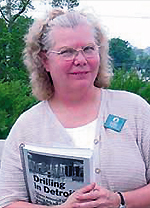|
by Ryan Silva
 Sierra Club activists in New York celebrated -- twice -- the ruling requiring General Electric to dredge toxic chemicals off the bottom of the upper Hudson River. On August 1, the Environmental Protection Agency declared GE responsible for the tons of cancer causing PCBs it dumped into the Hudson. Sierra Club activists in New York celebrated -- twice -- the ruling requiring General Electric to dredge toxic chemicals off the bottom of the upper Hudson River. On August 1, the Environmental Protection Agency declared GE responsible for the tons of cancer causing PCBs it dumped into the Hudson.
GE appealed, but on Dec. 4, the EPA confirmed its ruling, ordering GE to pay nearly half a billion dollars to clean up the river. This stunning victory didn't happen by accident or overnight, but resulted from years of intense work by local organizers, including the Sierra Club's Upper Hudson River Environmental Public Education Campaign (EPEC).
 "This victory clearly demonstrates that organized people can defeat organized money," says Bob Bingaman, Sierra Club's national field director. Even though GE poured more than $50 million into fighting this decision, the Club was able to counter with "fish-ins," radio ads, canoe trips and postcard mailings. "This victory clearly demonstrates that organized people can defeat organized money," says Bob Bingaman, Sierra Club's national field director. Even though GE poured more than $50 million into fighting this decision, the Club was able to counter with "fish-ins," radio ads, canoe trips and postcard mailings.
The EPEC program, now in its sixth year, connects grassroots organizers with chapters to work on local issues at 40 sites around the country. See EPEC highlights.
The Hudson River victory wasn't the only effort worthy of celebration this year. In Arizona, organizers mobilized to stop five new national monuments from being drilled for oil, mined for minerals and overrun by off-road vehicles. In Utah, volunteers worked to stop the Legacy Highway, which will pave over sensitive wetland habitat adjacent to the Great Salt Lake. In San Clemente, Calif., more than 1,700 activists attended four hearings to stop a proposed toll road that would cut up some of the last open spaces in Orange County.
 And elsewhere, organizers ensure that making progress isn't all work and no play. In Idaho, more than 600 people attended an "edu-tainment" concert put on by EPEC organizers featuring good tunes and a great message: Save the Owyhee Wilderness. And in Rhode Island, volunteers drummed up opposition to a major container port that would exacerbate pollution and sprawl in and around Narragansett Bay. And elsewhere, organizers ensure that making progress isn't all work and no play. In Idaho, more than 600 people attended an "edu-tainment" concert put on by EPEC organizers featuring good tunes and a great message: Save the Owyhee Wilderness. And in Rhode Island, volunteers drummed up opposition to a major container port that would exacerbate pollution and sprawl in and around Narragansett Bay.
One of the most prominent issues in the EPEC program is the battle to stop the infiltration of polluting concentrated animal feeding operations, CAFOs, into communities. CAFOs pose serious health and environmental risks because of the unsanitary way they discard their waste -- draining manure sludge into rivers or overflowing dumpsters with hog carcasses. Polluted rivers and streams and airborne pollution can lead to respiratory illnesses, rodent and fly infestations, antibiotic abuse and an unbearable stench. Standards for these facilities are generally set (or not set, as is too often the case) by the state and they vary widely.
"CAFO operators shop for states with the weakest regulations," says Michigan EPEC organizer Dan Farough.
To help, Farough and other EPEC organizers are working to educate communities on the threats of CAFOs -- to their water, air and personal health. And people are listening.
 Farough and friends have been pushing the Michigan Department of Environmental Quality to toughen CAFO standards and organizing citizen activists to stop new facilities from being sited. On April 22, organizers put together "Earth Day With an Attitude," an anti-CAFO rally on the steps of the state capitol. Rep. David Bonior (D-Mich.) spoke, as did a giant puppet of Gov. John Engler (R), and the event garnered statewide media exposure. Farough and friends have been pushing the Michigan Department of Environmental Quality to toughen CAFO standards and organizing citizen activists to stop new facilities from being sited. On April 22, organizers put together "Earth Day With an Attitude," an anti-CAFO rally on the steps of the state capitol. Rep. David Bonior (D-Mich.) spoke, as did a giant puppet of Gov. John Engler (R), and the event garnered statewide media exposure.
Farough hosted three "Tours de Manure" with the support of several local Sierra Club groups and coalition partners. The tours exposed community members and the media first hand to the stench and pollution produced by factory farms. The Michigan program got a huge boost when it successfully petitioned the federal Environmental Protection Agency to review Michigan's enforcement of the Clean Water Act. Vicki Pontz-Teachout, a director of the Department of Agriculture, told the Club, "your strategy worked." Victory is not yet at hand, but as a result of the Club's high-visibility campaign, Farough says "we are more feared by our enemies and more supported by our friends."
 Knowing that seeing is believing, the Alabama EPEC program, led by Peggie Griffin, premiered the movie, "The Scoop on the Poop," which publicizes some of the horror stories that have occurred in Alabama since CAFOs moved into the state in the mid-1990s. Griffin followed up the film opening with a "Just Say No to Hog Factories" rally at the state capitol, along with the Sand Mountain Concerned Citizens. The Alabama Chapter also put together "Celebrate the Small Family Farm" day, which toured local farms that raise free-range livestock, grow organic produce and use other sustainable farming methods. "It was a consumer education event that gave support to small farmers. It really helped people see how their spending habits and the success of these small farms are related. The fact that the food was great helped drive home our point." The chapter has decided to make the event an annual one. Knowing that seeing is believing, the Alabama EPEC program, led by Peggie Griffin, premiered the movie, "The Scoop on the Poop," which publicizes some of the horror stories that have occurred in Alabama since CAFOs moved into the state in the mid-1990s. Griffin followed up the film opening with a "Just Say No to Hog Factories" rally at the state capitol, along with the Sand Mountain Concerned Citizens. The Alabama Chapter also put together "Celebrate the Small Family Farm" day, which toured local farms that raise free-range livestock, grow organic produce and use other sustainable farming methods. "It was a consumer education event that gave support to small farmers. It really helped people see how their spending habits and the success of these small farms are related. The fact that the food was great helped drive home our point." The chapter has decided to make the event an annual one.
Next door in Mississippi, Louie Miller and allies have succeeded in getting a moratorium on new CAFOs in the state. And Miller knows there's strength in numbers. The EPEC program has helped enlist more than a thousand community members to take part in a class-action lawsuit targeting Prestage Inc., a major factory farm corporation.
 In Oklahoma, Jeanine Hale and partners helped expose the failure of the state's Department of Agriculture to monitor CAFO pollution. The director of the ODA even admitted the agency's inadequacy and agreed to meet with the Oklahoma Chapter's executive committee to discuss solutions. (Earlier this spring, the Club took on Seaboard, a giant factory farm corporation, in a federal lawsuit based on illegal waste discharges. The court has since upheld the Club's standing and ruled that the Clean Water Act applied to both groundwater and surface waters in this case because the two are so interconnected.) In Oklahoma, Jeanine Hale and partners helped expose the failure of the state's Department of Agriculture to monitor CAFO pollution. The director of the ODA even admitted the agency's inadequacy and agreed to meet with the Oklahoma Chapter's executive committee to discuss solutions. (Earlier this spring, the Club took on Seaboard, a giant factory farm corporation, in a federal lawsuit based on illegal waste discharges. The court has since upheld the Club's standing and ruled that the Clean Water Act applied to both groundwater and surface waters in this case because the two are so interconnected.)
In Kentucky, EPEC organizer Aloma Dew organized three "Tours de Stench" this year, highlighting individual homes that suffer from nearby CAFO pollution.
"We've slowed [CAFOs] down. Some are coming in, but they are starting to clean up their act. If the Sierra Club hadn't come into Kentucky, we would have seen a lot more," says Dew. "Even the governor has done an about face on the issue."
But perhaps the biggest achievement of the EPEC program in Kentucky as elsewhere is the new relationships the Sierra Club has made. "We have taken away some of the demonization of Sierra Club," says Dew. "A lot of people I work with would never have dreamed of working with us. Some have even become members of the Club."
EPEC Highlights:
Alaska: The EPEC program, which focuses on ending commercial logging in the Tongass National Forest, compiled hundreds of handwritten letters and postcards in support of the roadless rule. The program started the year with four volunteers and organized more than 50 by the end.
Alabama: Organizers turned up the heat on CAFOs with the release of "The Scoop on the Poop" film, rallies at the state capitol and countryside tours of eco-friendly farms.
Arizona: Dedicated to protecting the state's five new monuments from mining and oil drilling, local organizers have held slide shows and postcard drives, led tours and hikes, and recruited more than 500 volunteers.
 Arkansas: The EPEC/End Commercial Logging Campaign opened the first-ever Sierra Club office in Fayetteville, and delivered 3,200 forest protection postcards to Sen. Blanche Lincoln (D-Ark.) and Forest Supervisor Alan Newman. Other highlights include the well-attended Interior Highlands Workshop to End Commercial Logging on the National Forests and a press conference naming Arkansas' Ouachita National Forest the second most endangered in the nation. Arkansas: The EPEC/End Commercial Logging Campaign opened the first-ever Sierra Club office in Fayetteville, and delivered 3,200 forest protection postcards to Sen. Blanche Lincoln (D-Ark.) and Forest Supervisor Alan Newman. Other highlights include the well-attended Interior Highlands Workshop to End Commercial Logging on the National Forests and a press conference naming Arkansas' Ouachita National Forest the second most endangered in the nation.
California: In the Sacramento region, the EPEC team is promoting smart growth to protect prime agricultural land from sprawling development. On the coast, the Great Coastal Places of California campaign has built an activist base
of more than 2,000 members and plans to reach 5,000 by the end of 2002. At least 100 volunteers have turned out at each monthly meeting of the California Coastal Commission, the state agency responsible for California's coastal development. In southern California, the Friends of the Foothills coalition in San Clemente, which has more than 7,000 activists, is fighting to stop a tollroad that would destroy San Onofre State Beach, bisect some of the last open space in Orange County and destroy critical habitat for at least seven endangered species. They are also fighting the recent Ranchov Mission Viejo Co. development proposal to build 14,000 new houses and more than 5 million square feet of commercial and retail space in an undeveloped area.
Colorado: More than 600 citizens participated in the chapter efforts to preserve land and protect open space by tabling and writing letters. Volunteers also flocked to 13 hearings to ensure that the Great Outdoors Colorado Trust Fund directs lottery proceeds to preserve Colorado's landscapes.
Florida: The chapter continues to fight the expansion of the Suncoast Parkway, holding demonstrations at ribbon-cutting ceremonies and pressuring on Gov. Jeb Bush (R) to uphold the growth-management process.
Idaho: With the help of activists from neighboring states of Nevada and Oregon, the chapter is working to protect the Owyhee Canyonlands. Their spring "edu-tainment" concert, held at an historic Boise theater in April, drew more than 600 people. Their third annual Owyhee Rendezvous encampment was highlighted in the PBS show "Outdoor Idaho."
Illinois: By publicizing the dismal results of volunteer water monitoring programs, organizers are working to improve Clean Water Act enforcement and build demand for polluted water cleanup plans, stricter water pollution permits and controls on nutrient pollution. Their efforts paid off this year when strong new "anti-degradation" rules, which will protect clean streams by requiring a stringent review of any increases in water pollution, were introduced.
Indiana: With more than 100 dedicated volunteers, the chapter is fighting animal factories and reaching into rural communities in which grassroots activism is needed, but nearly nonexistent.
Kentucky: The "Old McDonald vs. Industrial Agriculture: Farmers, Safe Food and the Environment" conference in Louisville attracted 180 people, generated new activists and new alliances.
Louisiana: In addition to a successful Tour de Sprawl in New Orleans, the chapter held a "Car-Free Day" and a highly successful conference on sprawl in Baton Rouge.
Michigan: A coalition of groups and local activists pushed the state to enforce the law requiring water permits for CAFOs. Coalitions with labor groups helped deliver the Club's clean energy message in the state.
Minnesota: As part of its campaign to end commercial logging in Minnesota's national forests, organizers established a new Forest Watch program, which identified and trained volunteers on the ground to monitor public forests.
Mississippi: Organizers have helped prevent new CAFO permits under a moratorium. They recruited so many people -- more than 700 -- to two hearings that the state's Department of Environmental Quality director himself conducted both meetings.
Missouri: The EPEC program established itself as an authority on floodplain and water quality issues in the St. Louis area.
Montana: The campaign gained national attention for its efforts to save Weatherman Draw, a Native American sacred site threatened by oil production by Philip Anschutz.
Nebraska: To fight CAFOs entering Nebraska, the EPEC program has developed trusting relationships with rural farmers not used to working with the Sierra Club.
New Hampshire: Organizers successfully mobilized students in support of their campaign to ending commercial logging in national forests.
New York: The two EPEC campaigns in New York ended the year with victory celebrations. Working with a strong coalition, the Upper Hudson River EPEC program successfully pressured the Environmental Protection Agency to force General Electric to clean up the Hudson River. In New York City, activists worked to protect the Croton watershed from development and pollution. In December, Gov. George Pataki designated the watershed a Critical Resource Water area.
North Carolina: To combat sprawl, organizers worked to increase funding for the state's natural resource trust funds, which provide public funding for open space protection. Despite one of the worst budget crisis in the state's history, funding for the Clean Water Management
Trust Fund was increased and funding for the other trust funds was fully renewed.
North Dakota: Organizers met with Chief Dale Bosworth and U.S. Forest Service personnel in Washington, D.C., to discuss their efforts to protect grasslands. They've also collaborated with Gov. Hoeven, created strong coalitions, conducted four outing events, initiated college campus outreach and received excellent press coverage.
Ohio: The EPEC team, working to protect Cincinnati's Little Miami National Wild and Scenic River from a new sprawl highway, is garnering great local and national media coverage.
Oklahoma: Organizers are educating the public about CAFOs and rallying communities against the infiltration of animal factories. They've exposed the Department of Agriculture's reluctance to enforce state or federal environmental laws, and, working with the Club's Law Program, brought a lawsuit against one of the worst polluters, Seaboard.
Oregon: To protect the Tillamook and Clatsop state forests from logging in sensitive habitats, the EPEC team has held numerous events including the "Tillamook State Forest Celebration" and an event at Fort Clatsop that attracted nearly 400 participants.
Rhode Island: The EPEC team is fighting to stop a major commercial container port at Quonset Point that would create sprawl and pollution problems for Narragansett Bay.
South Carolina: The chapter is fighting to stop "Green Diamond," a 4,600-acre planned community slated to be built in a floodplain.
South Dakota: In addition to protecting wildlands, organizers in South Dakota have been active in exposing the Bush administration's anti-environmental policies. Working with activists and representatives of the Gwich'in Tribe from the Arctic Refuge, they put together a public presentation on the Arctic National Wildlife Refuge.
Southern Appalachian Highland Ecoregion: Organizers led Tours de Cut (outings to clearcuts) in Virginia, held an activist training in Georgia and rallied in Atlanta as part of efforts to end commercial logging in national forests. Also on tap: a long-range National Forest Protection Campaign in Georgia.
Tennessee: The EPEC program is working to end commercial logging on national forests in the state and protect the Cherokee River.
Utah: The work of the EPEC campaign - which led to a Club-initiated lawsuit -- has put at least a temporary halt to construction of the Legacy Highway, which would destroy more than 100 acres of sensitive wetland habitat. This wetland complex, an essential part of the Great Salt Lake ecosystem, is used by almost 9 million birds annually.
Vermont: The Vermont Chapter, a member of the Vermont Wilderness Association, packed a Forest Service public education forum on wilderness with a standing-room-only crowd. Thirty-eight of the 40 speakers were pro-wilderness; the other two were neutral. The chapter also generated a big crowd for a forum on timber harvesting at which 24 of 30 speakers spoke in support of wilderness.
Washington D.C.: In their campaign to stop sprawl, more than 40 volunteers distributed more than 25,000 postcards
advocating increased spending on public transportation.
Washington: Volunteers distributed and collected more than 30,000 postcards that went to local U.S. representatives, asking them to defend the wild forest roadless plan and Wild Skykomish Country, a unique and diverse national forest located about 90 minutes from Seattle. Numerous hikes and outings were conducted in the Wild Skykomish Country including a site visit by Sen. Patty Murray (D) and Rep. Rick Larsen (D).
Wisconsin: The EPEC team raised awareness of wildlands issues through a "Tour de Sprawl," a "Sprawl Hurts Us All" workshop and the Fall Festival for Preserving the Kettle Moraine and Farmland.
Photos (from top to bottom) courtesy Zachary Roth, Jennifer Rudolph, Jennifer Rudolph, (second to bottom) Lawson Legate, (bottom) Dave Muhly.
Up to Top
|